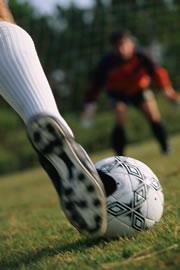 Kick it: repeated heading of the ball might harm the brain.Getty
Kick it: repeated heading of the ball might harm the brain.GettyBritish neuroscientists are planning to investigate whether playing soccer contributes to the development of motor neurone disease. The move comes after three amateur footballers playing in the same league developed the disease, which normally affects less than one person in every 50,000 each year.
Experts are now aiming to launch a full epidemiological study of professional footballers and motor neurone disease (MND) patients, to see whether the sport really does raise the incidence of the disease among those who play it at a high level.
Details of the patients, all of whom were committed footballers, are published in the journal Amyotrophic Lateral Sclerosis1 — a publication named after the most common form of MND. The patients range in age between 56 and 61 years old, and were all diagnosed with the disease within a decade of each other.
"What is unusual about this group is that they are all friends who developed MND at the same time," says Ammar Al-Chalabi of King's College London, one of the experts who described the cases. "A cluster like this could occur by chance, but the odds are quite long."
The three have several potential risk factors in common, including having been electrocuted by mains electricity at some point during their lives. But the authors note that the three were very keen at football, playing more than twice a week — almost as much as professional players.
"The next step is a proper epidemiological study," Al-Chalabi adds. He and his colleagues are planning to approach the Professional Footballers' Association to request data on former professional footballers, to see whether they have a higher than normal incidence of the disease.
Blows to the head
“Don't let this stop you playing football”
Brian Dickie, Motor Neurone Disease Association.
A possible link between football and MND, which causes paralysis and is ultimately fatal, has been found before. In 2005, Italian researchers reported that professional footballers playing in that country between 1970 and 2001 were more than six times more likely to have developed the condition2. These findings were a by-product of a study looking for evidence of past steroid abuse among footballers.
MND has a wealth of possible causes, including genetic factors. The most obvious suggestion in the case of soccer players is that repeated heading of the ball might harm the brain. Many boxers, most notably Muhammad Ali, who now suffers from a form of Parkinson's, have suffered brain diseases as a result of repeated blows to the head.
But two of the three English patients say they avoided heading the ball during play. And MND involves the death of motor neurons, most of which are deep in the brain and spinal cord, and would therefore be less likely to be damaged by impacts to the skull.
Another theory is that harmful pesticides on the grass, or compounds in the paint used to mark the pitch, might find their way into the bloodstream through minor grazes or even directly through the skin when the ball hits it, Al-Chalabi and his colleagues suggest. It is clear that some chemicals can kill nerve cells, although there is no established link to MND.
Yet another possibility is that the frequent high activity of motor neurons in sportspeople may generate large amounts of chemical waste products that damage nerve cells, leading to an increased likelihood of developing MND later in life.
Keep on playing
"Basically, all theories are valid at the moment. That's part of the problem," comments Brian Dickie, director of research development at the Motor Neurone Disease Association.
ADVERTISEMENT
Dickie says that "it's worth seeing if the Italian study could be replicated" in a study intended to look for a link between football and MND. He is currently spearheading the creation of a database of 1,500 MND patients and 1,500 carefully matched control volunteers, in a bid to tease out some of the causes of this rare condition.
Meanwhile, Dickie is at pains to point out that the health benefits of sport far outweigh the possible negatives. "Don't let this stop you playing football," he urges. "The Italians had a sixfold increase in likelihood of MND. That sounds like a lot but a sixfold increase in a rare disease still means it's a rare disease."
Visit our suggestedbetween_soccer.html">newsblog to read and post comments about this story.
